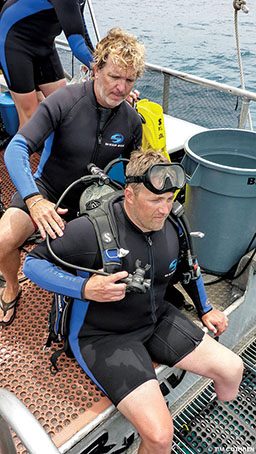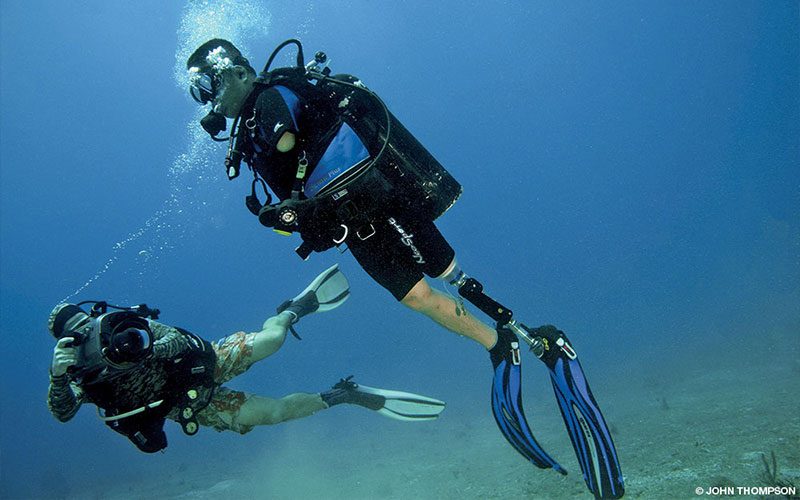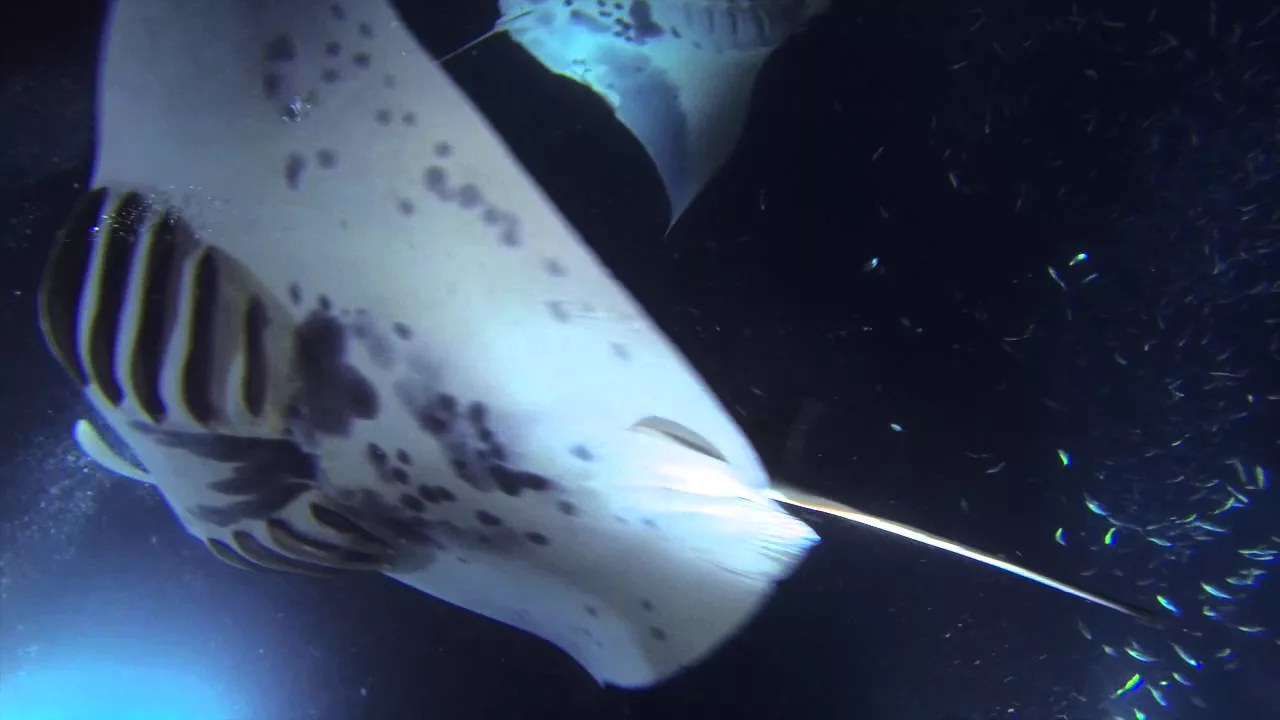Years Diving: 26
Hometown: Rincon, Puerto Rico
Favorite Dive Destination: Mona Island, Puerto Rico
Why I’m a DAN Member: “DAN has been a great supporter of SUDS over the years, and it is good to know they have your back in an emergency.”
“You can’t walk through the doors of Walter Reed Army Medical Center [now Walter Reed National Military Medical Center], see our injured young men and women coming back from the wars in Afghanistan and Iraq and not get involved,” recalled U.S. Army National Guard paratrooper John Thompson about his first visit to that hospital in 2005. “It was a real gut check.”
Thompson had been working for 14 years as a Colorado Outward Bound School instructor and 10 as a scuba instructor. His skills led him to a Red Cross volunteer position in the aquatic therapy department at Walter Reed, where he developed an idea. “There is a pool here, and I’m a dive instructor,” he thought, “so let’s try to use scuba diving in the aquatic therapy rehabilitation process.” He created Soldiers Undertaking Disabled Scuba (SUDS) in February 2007.
SUDS is not a simple jump-in-the-water program. Each veteran completes his or her academic and pool work at the hospital under the care and direction of several core SUDS volunteer instructors who have training in the Scubility Diver Program from Scuba Diving International (SDI). Next, SUDS arranges dive trips so the divers can complete their open-water training at destinations such as Puerto Rico, Hawaii, Guantanamo Bay and others. They finish the program as certified divers capable of diving just about anywhere.

“SUDS pays for all the veterans’ expenses, from airfare to meals and lodging,” Thompson explained. “There is no cost to the participant.” SUDS, a subordinate chapter of Disabled Sports USA, is a grassroots nonprofit organization based at Walter Reed in Bethesda, Md. It has only one paid employee and relies solely on donations from the general public. Local restaurants, residents and dive operators offer assistance during trips.
For some veterans these trips are their first forays away from their hometowns that don’t involve deployment, combat or a hospital. Marine Sgt. Greg Edwards, a double amputee, reflected as he looked into the clear blue water of the Virgin Islands: “I’ve never been anywhere but Mississippi and Iraq; this is awesome!”
SUDS also has a growing number of returning vets who have fallen in love with the sport and are working on advancing their certifications. “Lots of veteran organizations just give stuff away; what I love about SUDS is that it is about bettering yourself,” said Redmond Ramos, a U.S. Navy hospital corpsman. “John is adamant about us getting another certification and advancing our skills — it is about becoming a better diver.”
Therapy is still at the center of the organization. “The majority of the veterans we work with are amputees,” Thompson said, “but we see all sorts of injuries, from severe burns to traumatic brain injuries, PTSD and paralysis. Water is a great equalizer.” Volunteers often hear veterans say things like “The pain vanishes when I’m weightless,” and “I find peace of mind underwater that I can’t find on land.”
An unusual concert of popping and clicking occurs before each dive as prosthetic legs are removed and replaced with specialized devices featuring mechanical ankles that can be articulated and moved downward as a foot would during swimming. Some divers prefer to go without the finned prosthetic. Greg Edwards uses webbed gloves to pull himself through the water. “Just because you have legs and I don’t doesn’t mean you’re better than me,” Edwards said. “I can do anything you can underwater.”
One of the more unusual dive destinations for the group is Naval Station Guantanamo Bay (GTMO) in Cuba. Thompson was stationed there in 2003 and built a relationship with Ocean Enterprises, the local dive shop on the base. The warriors meet at a small air charter company in Fort Lauderdale, Fla., and board a flight to GTMO. It takes about three hours to fly there because the small prop planes have to veer all the way around the east end of the island to avoid Cuban air space. The dive shop and the Reef Raiders dive club raise funds to provide accommodations for the veterans. Checkout dives are done right there in the bay, but the big payoff is being able to dive from secluded beaches that are usually off limits even to the individuals stationed there. Since any outside boat traffic has been prohibited there since 1898, the reefs are pristine. You won’t find any lost snorkels on the bottom here.

A crew from the HBO series Real Sports with Bryant Gumbel joined a SUDS group at Guantanamo and filmed soldiers enjoying the experience for a segment titled “Underwater Heroes,” which aired in June 2009. Some veterans used scooters to get around the virgin reefs. Styrofoam fish were floated mid-water to create an underwater shooting range for spearfishing. Virtually untouched by humans, the reefs were thick with life, including some very large lionfish that had invaded the waters.
As the wars have been winding down, the number of wounded service members coming off the battlefield has slowed. SUDS has refocused its efforts toward continuing dive education while still reaching out to the military’s wounded, ill and injured. To date, the organization has trained more than 400 injured soldiers to dive.
Thompson is a man of few words, but he is proud and passionate about diving and helping our injured servicemen and women. “I often say I have the greatest job in the world,” he said. “I’m blessed — I think I get even more out of this than the warriors. I have a lot of great help, and I get tremendous satisfaction from contributing to the recovery of our veterans”
“A city boy like me never would have attempted anything like this if it weren’t for John and SUDS,” said U.S. Army Sgt. Javier Torres, a New York native who was shot in Afghanistan. “Now I want to advance my certification and become an instructor so I can help other wounded veterans — just like John does.”
Explore More
Watch Tim Cothren’s video about Soldiers Undertaking Disabled Scuba (SUDS).
© Alert Diver — Q1 Winter 2016

